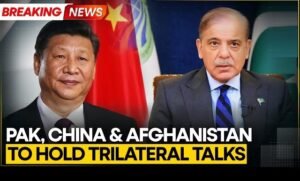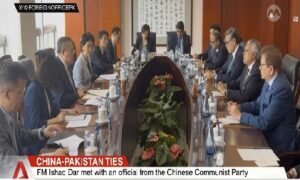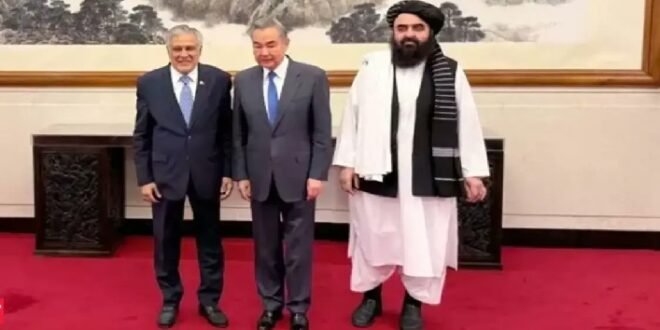25-05-2025
ISLAMABAD/ KABUL/ BEIJING: As Pakistan remained embroiled in a war of words with its archrival India, following a dramatic exchange of missiles and drones nearly two weeks ago, it this week advanced diplomatic efforts with two other neighbors: China and Afghanistan, which could lead to the formal resumption of diplomatic ties between Islamabad and Kabul after nearly four years.
 In an “informal” trilateral meeting held in Beijing on May 21, the foreign ministers of China, Pakistan and Afghanistan convened under a forum first launched in 2017, and which last met in May 2023.
In an “informal” trilateral meeting held in Beijing on May 21, the foreign ministers of China, Pakistan and Afghanistan convened under a forum first launched in 2017, and which last met in May 2023.
This time, a key outcome from the meeting, according to Chinese Foreign Minister Wang Yi, was a renewed willingness by both Pakistan and Afghanistan to restore diplomatic relations after heightened tensions in recent years.
“Afghanistan and Pakistan expressed clear willingness to elevate diplomatic relations and agreed in principle to exchange ambassadors as soon as possible. China welcomed this and will continue to provide assistance for the improvement of Afghanistan-Pakistan relations,” Wang said.
He added that the China-Pakistan Economic Corridor (CPEC), a $62bn mega project under China’s Belt and Road Initiative (BRI) will now be extended into Afghanistan.
A Pakistani diplomat with direct knowledge of the talks told Al Jazeera that the next round of the trilateral meetings will be held “very soon”, within a few weeks, to build on the momentum from the Beijing conclave.
“I am reasonably optimistic about the outcomes. It was a great confidence- and trust-building exercise between the three countries,” said the official, speaking on condition of anonymity about the Beijing meeting.
Trilateral diplomacy amid Indo-Pakistan tensions
The meeting came after a four-day standoff between Pakistan and India, with both countries claiming “victory” and launching diplomatic offensives to assert dominance.
 The conflict, from May 7 to May 10, followed Indian strikes on what it called “terrorist infrastructure” in Pakistan, in retaliation for the Pahalgam attack in Indian-administered Kashmir last month that left 26 civilians dead. India blamed the attack on Pakistan-based armed groups, an allegation Islamabad denies.
The conflict, from May 7 to May 10, followed Indian strikes on what it called “terrorist infrastructure” in Pakistan, in retaliation for the Pahalgam attack in Indian-administered Kashmir last month that left 26 civilians dead. India blamed the attack on Pakistan-based armed groups, an allegation Islamabad denies.
While China urged restraint on both sides, its support for Pakistan was evident on the front lines of the conflict, with the Pakistani military using Chinese fighter jets, missiles, and air defence systems.
On the other hand, Indian Foreign Minister S Jaishankar said on May 15 that he appreciated Afghan acting Foreign Minister Amir Khan Muttaqi’s “condemnation” of the Pahalgam attack, in a conversation between the two. Indian media also reported a visit to New Delhi by senior Taliban figure and deputy interior minister, Ibrahim Sadr, in early May.
Mustafa Hyder Sayed, executive director of the Islamabad-based Pakistan-China Institute, called the Beijing meeting “very significant”, given Afghanistan’s geopolitical sensitivity.
For Pakistan and China, the “conflict with India has reinforced strategic clarity” on the need to work closely with Afghanistan, Sayed said.
Kabul-based political analyst Tameem Bahiss agreed.
“This [the call between Muttaqi and Jaishankar] signals a major shift in India-Afghanistan relations, one that could raise concerns in Islamabad amid an already volatile regional climate,” he said. “The timing of this trilateral meeting, not just its content, reflects an urgent need for coordination among these three countries as new geopolitical dynamics take shape in South and Central Asia.”
 Pressmediaofindia
Pressmediaofindia




